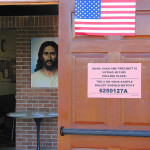We run our website the way we wished the whole internet worked: we provide high quality original content with no ads. We are funded solely by your direct support. Please consider supporting this project.

Do Not Fear
We interrupt this election season to bring you the following reminder:
[F]ear is a diabolic force. Its ultimate creator is Satan, and he uses it to keep us in bondage (Heb. 2:15). Throughout history, leaders have used fear to rally the masses around their causes, sometimes getting them to do things they otherwise would never dream of. Most of the worst atrocities committed in history–by so called Christians and others–were motivated by fear. People felt threatened, demonized the ones who threatened them, and thus felt justified in doing whatever they thought necessary to protect themselves. It is impossible to live in love and live in fear at the same time, which is why Scripture says that love casts out fear (1 John 4:18).
Now, as kingdom people we are called to live in love, which means we are called and empowered to live free of fear. Because our source of worth, significance, and security is found exclusively in God’s love and God’s reign, not our own immediate well-being, and because we believe in the resurrection, we are empowered to love even those who threaten our well-being–for this does not threaten our essential worth, significance, and security. We are, therefore, not to fear them (see 1 Peter 3:14-18). If we do fear them, it is only because some element of our essential worth, significance, and security is rooted in what they threaten. In other words, fear is an indication that we are living in idolatry, not love.
All this is to say that kingdom people whose lives are exclusively rooted in Jesus Christ will not succumb to motivation by fear. Our motivation for all we do is to be love, not fear (1 For. 16:14; 2 For. 5:14).
–The Myth of a Christian Nation, pp. 179-180
Photo credit: Greg Rakozy via Unsplash
Category: General
Tags: Fear, Love, Politics, Religious Idolatry
Related Reading

Responding to Critics On A Pacifist View of the Syrian Crisis
On September 3rd, I wrote a post entitled What I – a Pacifist – Would Say to Obama About the Syrian Crisis in response to a number of questions I was getting, and judging from the “shares” and Twitter activity, this essay seems to have struck a chord. Not surprisingly, it also generated some criticism, for…

Conservative/Liberal are not Theological Categories
We wanted to repost something by Jonathan Martin today that struck a chord with us about the theological emptiness of political boxes. It’s brief and beautifully written and we hope you’ll read the entire article here. For those of you who are weary of the political tug-of-war for your soul, here’s some hope: And so…

The Rule of Love
The traditional confession that Scriptura sacra sui ipsius interpres (“Sacred Scripture is its own interpreter”) presupposes that there is one divine mind behind Scripture, for example. Moreover, Church scholars have traditionally assumed that Scripture’s unity can be discerned in a variety of concepts, motifs, themes and theologies that weave Scripture together. And to speak specifically of the…

Is Longing for Justice Inconsistent with Love? A Response to Paul Copan (#3)
In a paper delivered at the Evangelical Theological Society in November, Paul Copan spent a good amount of time arguing that aspects of the NT conflict with the understanding of love that I espouse in Crucifixion of the Warrior God (CWG). For example, Copan cites the parable Jesus told in Luke 18:1-8 about a widow…

The Cruciform Trinity
As paradoxical as it sounds, if God is supremely revealed when he stoops to the infinite extremity of becoming his own antithesis on the cross, then we must conclude that stooping to this extremity out of love must, in some sense, be intrinsic to who God eternally is. And rendering this coherent necessitates that we…

Greg and Bruxy Pulpit Swap
Greg Boyd and Bruxy Cavey swapped pulpits last weekend. Here are a couple of clips to give you an idea of what each of them offered. You can access the full sermons here and here.
